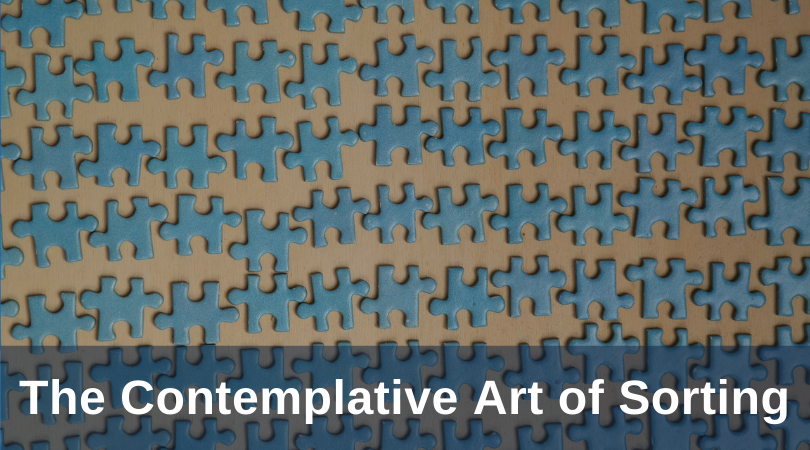
I am currently working in our community’s archives, spending my days sorting hundreds of documents and artifacts. The boxes seem endless, lined up on long tables, as I sit there handling one item at a time. While there was a period of my life when this kind of activity—identifying what something is and deciding where it ought to be filed—would have been too intellectually stimulating for me and led to burnout, I now see it as a privileged opportunity to get in touch with my executive functioning skills.
This process has got me thinking about the emphasis that Jesus places on sorting in the Gospels: the weeds must be sorted out from the wheat (Matthew 13:30); the sea junk must be sorted out from the catch of fish (Matthew 13:48); the goats must be sorted out from the sheep (Matthew 25:32); even Jesus himself must be sorted out from the rest of Israel (crucified as he was outside the walls of Jerusalem). This pattern of sorting one thing from another is really at the foundation of our existence, from the separation of light and darkness at the beginning of creation (Genesis 1:3–4), to the setting of human beings apart from everything else on the sixth day (Genesis 1:26–31), to the designation of the seventh day as a time away from all work (Genesis 2:2–3).
One might therefore say that the Christian life comes down to getting back in touch with that original “sorting rhythm” lost by our first parents’ sin, which led to great interior confusion about the difference between good and evil. Indeed, the psalmist insists that life is a constant choice between “the path of the wicked” and “God’s laws” (cf. Psalm 1 and Psalm 119), while the prophets exhort us to listen for that “still small voice” amid the noises of the world (1 Kings 19:12). Perhaps this is why sorting a bucket of screws in our shed or cleaning out a closet can be such contemplative experiences.
The discipline of a nightly Examen can help us to fine-tune this ability to discern well. While there is a step-by-step process you can learn to offer this prayer developed by St. Ignatius, you can also make a nightly examination of conscience. Simply kneel down by your bedside (or sit in a chair), make the Sign of the Cross, then look within: “When I said ‘I love you’ to my spouse this morning, I meant it, right? Should I have offered money to the gentleman on the street corner whom I saw on my way to work? What was my motive when I gave that compliment to my colleague before the meeting today? Seeing my children doing their homework when I came home just made my heart sing! Sharing a meal together as a family is the greatest blessing of my day. Did I watch too much television in the evening? How can I be of service to you, O Lord, tomorrow and the rest of the week?” Closing with the Lord’s Prayer, perhaps we get a taste of just how Jesus sorted things out in his own life (cf. Luke 5:16). Like a muscle that is strengthened the more it is used, this prayer of sorting will increasingly put us in touch with the living God at whose eucharistic table our salvation shall be sorted out permanently.
Like what you read? Submit your email below to have our newest blogs delivered directly to your inbox each week.
Featured image by Hans Braxmeier via Pixabay


